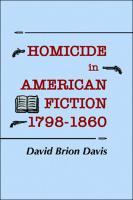Homicide in American Fiction, 1798–1860
A Study in Social Values
Author(s)
Davis, David Brion
Language
EnglishAbstract
Homicide has many social and psychological implications that vary from culture to culture and which change as people accept new ideas concerning guilt, responsibility, and the causes of crime. A study of attitudes toward homicide is therefore a method of examining social values in a specific setting. Homicide in American Fiction, 1798–1860 is the first book to contrast psychological assumptions of imaginative writers with certain social and intellectual currents in an attempt to integrate social attitudes toward such diverse subjects as human evil, moral responsibility, criminal insanity, social causes of crime, dueling, lynching, the "unwritten law" of a husband's revenge, and capital punishment. In addition to works of literary distinction by Cooper, Hawthorne, Irving, and Poe, among others, Davis considers a large body of cheap popular fiction generally ignored in previous studies of the literature of this period. This is an engrossing study of fiction as a reflection of and a commentary on social problems and as an influence shaping general beliefs and opinions.
Keywords
Literature: history and criticism; History of the Americas; Literary studies: fiction, novelists and prose writersDOI
10.7298/v897-2m89ISBN
9781501726217, 9781501726200, 9781501726224, 9781501726217, 9781501726224Publisher
Cornell University PressPublisher website
https://www.cornellpress.cornell.edu/Publication date and place
Ithaca, 1968Imprint
Cornell University PressClassification
Literary studies: c 1800 to c 1900


 Download
Download Download
Download Web Shop
Web Shop